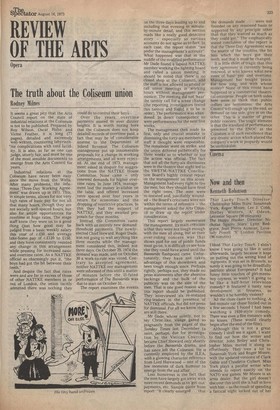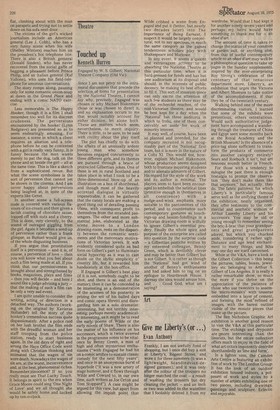Cinema
Now and then
Kenneth Robinson
That Lucky Touch. Director: Christopher Miles Stars: Susannah York, Roger Moore, Lee J. Cobb, Shelley Winters, 'A' Odeon, Leicester Square (90 minutes) The Happy Hooker. Director: Ni.cholas Sgarro Stars: Lynn Redgrave, Jean Pierre Aumont, Lovelady Powell. 'X' London Pavilion (96 minutes) Hiked That Lucky Touch. I didn't know I Was going to like it until afterwards, largely because it kept on putting out the wrong kind of signposts. It was set in Brussels, so surely it was going to be dreadfully patriotic about Europeans? It had funny little touches of girl-meetsboy coyness, so wasn't it going to be like a half-hour television comedy? It featured a nasty new development in firearms, so wouldn't it be horribly violent?
All the clues came to nothing. A last-minute car chase fizzled out in a few seconds. I found I had been watching a 1930-style comedy. There was even a fine romance with no kisses. (These would clearly begin after the end of the film).
Although this is not a great comedy I shall see it again. I want to find out how the writer and director, John Briley and Christopher Miles, moved it along so effortlessly. They owe a lot to Susannah York and Roger Moore, with the updated versions of Clark Gable and Claudette Colbert. Miss York plays a pacifist writer who intends to report nastily on the NATO war games. Mr Moore is an arms dealer. But the girl doesn't *discover this until she is half in love with him — as the result of spending a farcical night locked out of her flat, climbing about with the man on parapets and trying not to settle down on his sofa next door.
The victims of the girl's wicked journalism include an American general (Lee J. Cobb), who has a very funny scene when his wife (Shelley Winters) reaches him on the president's hot telephone line. There is also a British gemeral (Donald Sinden), who has never recovered from the social gaffe of bagging a pheasant before Prince Philip, and an Italian general (Raf Vallone), who uses his field-telephone for amorous conversations.
The story romps along, pausing only for some romantic onion-soup at dawn in the Grand Place and ending with a comic NATO exercise.
Less memorable is The Happy Hooker, though it is a film I shall remember too well for its discreet crudeness. The perversions encountered by the hooker (Lynn Redgrave) are presented so as to seem endearingly amusing. For instance, a scene in which a client requires an alsation and a telephone before he can be contented with a girl is really very funny. It is funny because the man wants merely to pat the dog, talk on the phone and sit beside the girl — all at the same time. This is like a sketch from a sophisticated revue. But what the scene symbolises is the sort of perversion that cannot yet be shown in the cinema. And I am never happy about perversions being laughed at, in spite of the experts like Genet.
In another scene a full-screen nude is covered with various flavours of ice-cream and then given a lavish coating of chocolate sause, topped off with nuts and a cherry. This is done, very cleverly, to the sound of outraged giggling from the girl. Again it becomes a send-up of perversion rather than a frank glimpse, as Bunuel would give us, of the whole disgusting business.
If you argue that prostitution itself is a perversion — and it is, of course, a perversion of love — then: you will know what you feel about such a film being made at all. If you think that our permissiveness is brought about and strengthened by books, magazines, plays and films — then you will decide — and here l' sound like a judge advising a jury — that the making of such a film can be only a very sad event.
I am quite unable to consider the writing, acting or direction in a detached way. The authors (working on the original by Xavieras Hollander) tell the story of the hooker's tremendous success quite dispassionately. After a police raid on her lush brothel the film ends with the dreadful woman and her staff trooping from the police station, ready to start business again. In the old days of right and wrong the Hays Office Code went along with Christian thinking and intimated that the wages of sin were death. Nowadays the wages of sin are, at the worst, inconvenience and, at the best, phenomenal riches. Remember,irinocence? If so you really must see That Lucky Touch. It belongs in spirit to the era when Grace Moore could sing 'One Night of Love' and we all thought she would be safely home and tucked up by ten-o-clock,



































 Previous page
Previous page